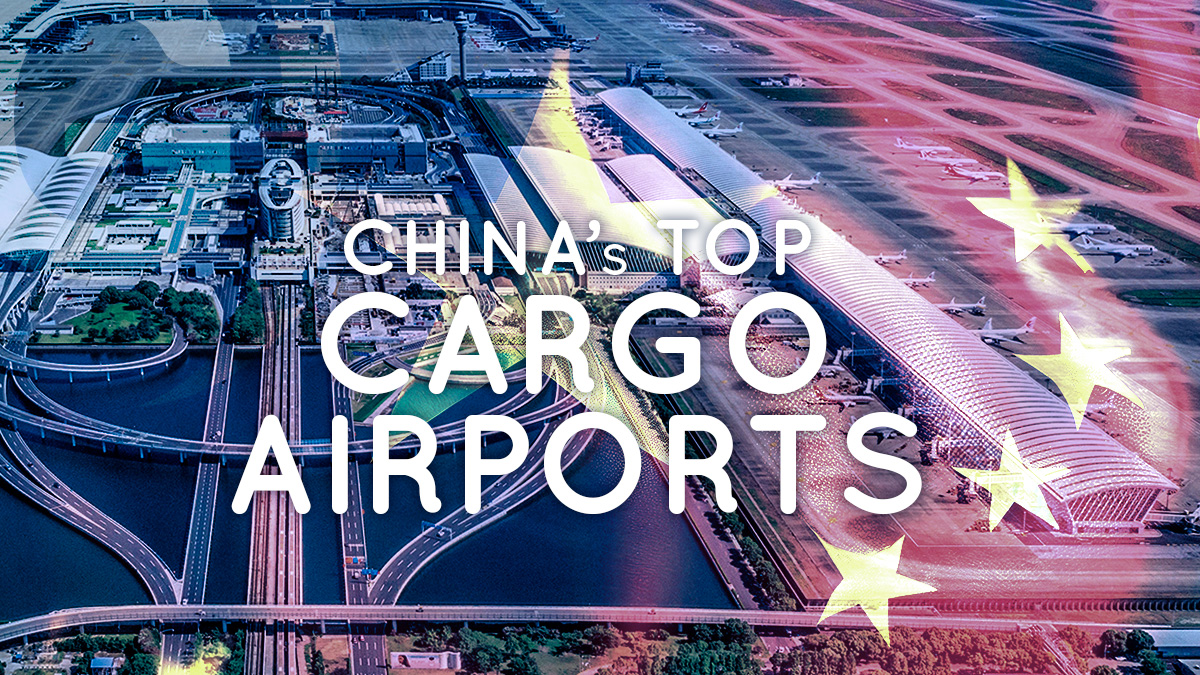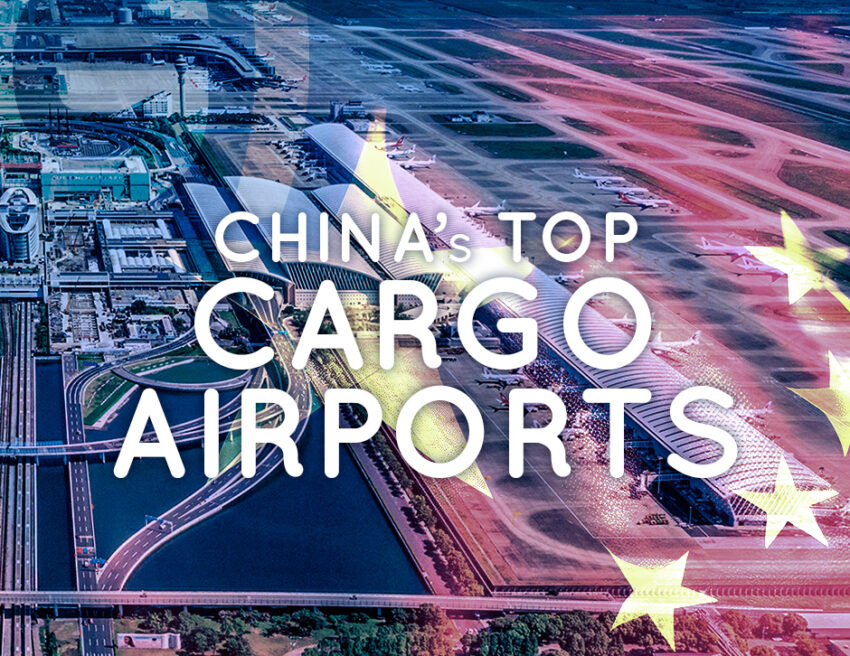China’s air freight industry is nothing short of a powerhouse. As one of the world’s largest export hubs, China’s logistics capabilities have been driven by a vast network of airports, ports, and roads that connect the country’s production centers to every corner of the globe. In particular, the country’s cargo airports play a pivotal role, handling millions of tonnes of cargo every year and serving as vital conduits for international trade. It needs to be mentioned in this context that Chinese air freight forwarders have found joining logistics networks, such as Globalia Logistics Network, to be a valuable strategy for expanding their services and staying competitive in this fast-paced industry.
In this blog, we’ll explore China’s air freight landscape, the benefits of logistics network membership for air freight forwarders, and highlight the top cargo airports in China that form the backbone of the industry.

The Air Freight Industry in China
China’s air freight industry has seen exponential growth over the last decade, propelled by booming e-commerce, increased global trade demand, and the rise of high-tech industries that rely on fast, efficient shipping. China’s largest airports are central to meeting this demand, managing cargo from electronics and pharmaceuticals to luxury goods and everyday consumer products. In addition, with the increasing significance of supply chain resilience, the Chinese air freight sector has made strides to address disruptions and maintain continuity even during periods of global uncertainty.
While sea freight has traditionally been the primary mode of moving goods, air freight has emerged as the go-to choice for time-sensitive cargo. As a result, China has invested heavily in infrastructure to support the industry, with massive airport expansions, enhanced cold-chain capabilities, and digital transformations aimed at streamlining customs processes and optimizing cargo handling.
Why Joining a Logistics Network Benefits Air Freight Forwarders in China
For air freight forwarders in China, joining a logistics network like Globalia Logistics Network provides multiple benefits, from business growth to access to extensive industry resources. Here’s how it can make a significant impact:
- Global Reach and Connectivity: Membership in a reputable logistics network connects Chinese air freight forwarders to an international network of partners, opening doors to business opportunities worldwide. With clients seeking services across continents, a network like Globalia provides the reach needed to compete on a global scale.
- Cost and Time Efficiency: Coordinating shipments through a network means forwarders can collaborate with trusted partners for the most efficient routes and competitive rates. This often translates into cost savings for clients and smoother operations for forwarders, enhancing their reputation and attracting more business.
- Enhanced Service Offerings: Joining Globalia allows Chinese forwarders to offer a full suite of services by tapping into the expertise of network members in different specializations. From customs clearance and warehousing to last-mile delivery, the support of over 205 partners can extend a forwarder’s capabilities.
- Payment Protection and Trust Building: For Chinese forwarders working with international clients, payment security is essential. Globalia offers an optional Payment Protection Plan protecting members against losses due to uncollected debts from other members in the event of bankruptcy or insolvency.
Joining a logistics network like Globalia Logistics Network empowers Chinese air freight forwarders to compete more effectively, enhance service quality, and expand their market reach, making it a strategic move for those looking to grow in a crowded industry.
Not a member yet? Join us today!
Top Cargo Airports in China
China boasts some of the busiest and most advanced cargo airports in the world, equipped to handle the massive volumes of goods flowing in and out of the country. Here’s a closer look at the top cargo airports in China and their key attributes:
Shanghai Pudong International Airport (PVG)
As the busiest cargo airport in China, Shanghai Pudong International Airport is a key gateway for Chinese exports, particularly high-tech and time-sensitive goods. Located in the eastern region, Pudong handles over 3.6 million tonnes of cargo each year, thanks to its proximity to China’s industrial hubs and advanced cargo-handling infrastructure.
Pudong is equipped with dedicated cargo terminals, cold-chain facilities, and a network of freight-forwarding companies that contribute to its efficiency. The airport is continually expanding, with new terminals and cargo villages that provide air freight forwarders access to world-class logistics support, which is essential for maintaining the flow of goods.
Beijing Capital International Airport (PEK)
Beijing Capital International Airport ranks as one of China’s busiest airports for both passenger and cargo transport. As China’s capital, Beijing’s cargo airport is a hub for diplomatic goods, electronics, pharmaceuticals, and high-value items. Handling approximately 2 million tonnes of cargo annually, Beijing’s airport is well-positioned for freight forwarders looking to serve both domestic and international markets. Recent investments have expanded PEK’s cargo facilities, integrating automation for faster processing and security features that streamline handling.
Guangzhou Baiyun International Airport (CAN)
Guangzhou Baiyun International Airport, located in the Pearl River Delta, is another top player in China’s cargo airport scene, handling around 1.8 million tonnes of cargo annually. The airport is central to South China’s export-driven economy and a major hub for goods bound for Europe, the Americas, and the Asia-Pacific region. Baiyun Airport’s strategic position, combined with its state-of-the-art facilities, makes it a popular choice for perishable goods and high-value electronics. As part of its cargo infrastructure, CAN has built an extensive network of cold-chain and e-commerce warehouses, allowing air freight forwarders to handle temperature-sensitive shipments with ease.
Shenzhen Bao’an International Airport (SZX)
Located in one of China’s fastest-growing cities, Shenzhen Bao’an International Airport is a critical hub for high-tech products, textiles, and machinery. The airport’s proximity to Shenzhen’s tech and manufacturing industries means that it handles significant volumes of electronics bound for overseas markets. In recent years, Shenzhen’s cargo volume has reached nearly 1.3 million tonnes annually, and it’s on track for even more growth as the area’s industries expand.
Hong Kong International Airport (HKG)
Although technically outside mainland China, Hong Kong International Airport is an essential part of China’s cargo infrastructure. HKG handles more air freight than any other airport in the world, managing over 5 million tonnes annually, with much of it originating from or bound for mainland China. Hong Kong’s status as a free port and its strategic location make it a critical link between Chinese manufacturers and global markets. Hong Kong’s advanced cargo facilities include express cargo terminals, temperature-controlled storage, and on-site customs clearance, ideal for handling high-value and time-sensitive shipments.
Conclusion
China’s air freight industry, driven by the busiest cargo airports in China, plays a vital role in global trade. With an ever-growing demand for efficient, reliable air transport, the industry faces both challenges and opportunities, especially for air freight forwarders looking to compete on an international scale.
Joining a logistics network like Globalia Logistics Network can significantly boost an air freight forwarder’s reach, efficiency, and service offerings, while also providing access to payment protection and valuable industry insights. As the top cargo airports in China continue to evolve and expand, forwarders affiliated with networks like Globalia are better equipped to navigate these developments and take advantage of the country’s robust logistics infrastructure.
For air freight forwarders in China, these airports are more than just transit points—they are critical hubs that, when combined with the right partnerships, can support the growth and success of their businesses for years to come.


